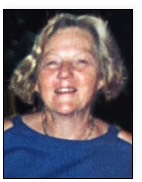
Hanna Schwarz
An Interview by students of the Rhön Gymnasium
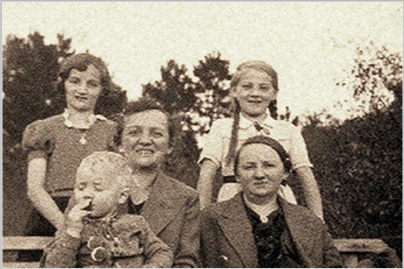
Hanna Schwarz (Klein) top right, pictured with her mother Gretel Klein, bottom right, her aunt Selma, bottom left, holding brother Walter.
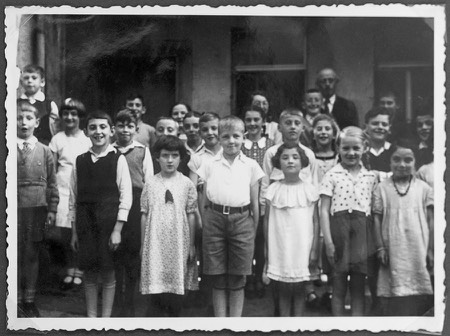
Move mouse over image to magnify details
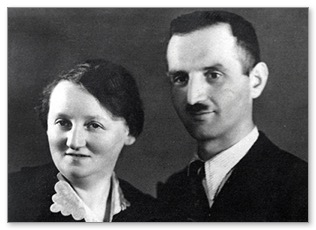
Parents, Gretel & Hugo Klein
1. Can you tell me about your parents Gretel and Hugo Klein? Where did your parents (grandparents) come from? What profession did they have?
My father was born in Middlestreu and my mother was born in Poppenlaur. I have few memories of my grandparents. My paternal grandfather sold things door to door - I don't remember what. My father made leather clothing including clothing for the people who flew gliders (at the Wassecooper). He had to close his business in 1938. I don't know how he kept us going after that.
2. How many sisters and brothers do you have? How old were the children when they came to England with the transport?
There were a total of five of us, 3 boys and 2 girls. My oldest brother , Siegbert was 15, the next brother, Ludiwig, was 14, my sister Kathe was 13, I was 12 and my youngest brother, Walter, was 3.
3. Do you have memories of Bad Neustadt? If yes, which memories?
I remember the town and the heart shaped wall with 3 towers. I was born in Middlestreu but we had to move from there so we could go to school. When we lived in Bad Neustadt, we used to walk around the wall on Saturdays. I remember walking around the wall in the summer when it was hot and seeing the people in the town pool. We were not allowed to go in it. We could not attend the regular school - we had to go to a special Jewish school with a terrible teacher. He was cruel and hit us. I was a terrible student. (School was much better and the teachers were much nicer once we arrived in England) Sometimes we could not go to the Marketplatz because there were Nazi parades. We had to move twice while we lived in Bad Neustadt because our apartments were on the Marketplatz or on the main street. The last house we lived in was on the street near the synagogue (during the war it was a doctor's office). The house was owned by a Jewish man, so we could rent from him. My father was well liked and had many Christian friends. They tried to help my parents at the beginning of the war.
4. When did your parents decide on this transport and why?
She thinks most people knew about the Kindertransport. She is not sure what made them choose this option. Maurice Barron (an Englishman who owned Craven cigarettes) somehow contacted my parents offering to help them. He helped pay for my schooling
5. And how does it work? Do you have to have known the family in advance?
We did not go to live with a family. We went to live in a boarding school called Stoatley Rough in Hazelmere, England. It was run by Quakers and some of the teachers were originally from Germany. Kay and I stayed there for 4 years. After 2 years there, I worked part time at the school. My brothers were considered enemy aliens, so they were sent to work on farms within a few months of arriving in England. My youngest brother Walter was sent to a children's home. After one year, we were able to convince the matrons at the school to have him come and live with Kay and me at Stoatley Rough. He stayed there until he came to the USA with his brothers in 1947.
6. When and from where were you taken with the transport to England? Can you remember the leave?
We boarded the train at Frankfurt, a special train for the children going to Holland. There were Jewish adults on the train to take care of us but they had to return to Germany or the Nazi would not let another train leave. I remember us all crying at the station. I remember getting food and an orange from the people in Holland. They were very kind to us.
7. Where all the children are taken away together and came to the same family? (see above)
8. What experiences have you had with the transport? Were you and your brothers and sisters are treated well?
9. How were you received in England? Has your host family received you well and did you quickly become accustomed to the daily routine?
When I was in the boarding school, I did not have much contact with English people because about 90% of the students and most of the teachers were from Germany. But when the school was closed at Christmas, different families did offer to take us for the holidays, at least for the first year or two. After that, the school did not close at the holidays.
10. Did you go to school there and maintain social contacts?
My sister Kay and I stayed at Stoatley Rough until we each were 16. Kay went to a school in London to learn how to sew and I went to a different school in London(Northern Polytechnic) to learn how to cook. I lived in a hostel with other Jewish girls. After one year, the bombing was so bad that I asked to move away from London. I then moved to Manchester. The hostel there was better, a smaller hostel but people were nicer. I lived in Manchester from 1945 to 1948.
11. Did you have contact with your parents and brothers and sisters?
We got one or two letters from our parents at the beginning of the war, but nothing after that. My parents wrote us letters the night before they were transported to the concentration camp. They gave it to friends who buried it in their garden. We don't know how or timing, but Siegbert (now called Bob) was in the US army and got back to Germany in 1948. He somehow got the letters from our parents. However most of us did not know the letters existed until second older brother Ludi died in 1991.
We all got together once during the years we lived in England. We kept in contact by letter. We went back to Stoatley Rough periodically to see Walter.
12. During your stay, did you had hope that your parents manage to escape?
We always hoped that they would make it, but by the end of the war we knew they had not survived.
13. How did the people dealt with the fact that you were Jews and German?
14. What have you experienced and made in England?
15. When did you realize that you will never see your parents again? Did they tell you? How did you deal with this knowledge?
16. After the ending of the Second World War, how has your life developed? What had motivated you to go to the USA?
After the war, in 1947, my sister Kay had gone to Israel (or tried to go to Israel) and my three brothers had all gone to the United States because we had family in New York City. So I wanted to be with my family. So I came to NYC in February 1948 and stayed with my aunt and uncle for a month or two. I could not find a job in the field I had training and experience in (running cafeterias), so I got a job as a nanny to two Jewish children. I stayed there until I got married to another German Jew in 1950.
17. Did you want to go back to Germany sometime?
I had no interest in going back to Germany for many years. However, Karlsruhe invited Jewish families to come back on the 50th anniversary of Kristallnacht. My husband came from Karlsruhe, so I went with him. While there, we rented a car and drove to Bad Neustadt for one day. I recognized everything in the town – tower, the wall, my house, the Synagogue, the school, the Marketplatz – everything was still the same. Since that first time, I have been back around four times. The first time many Klein family members went back in a large group. My brother Walter and I and some of my family went to Bad Neustadt for the dedication of the memorial to town people killed in the Holocaust.
18. Have you done that? What experiences have you had in Germany?
See question 17.
Other thoughts
It was difficult leaving parents and then having the war start a week later. We and Maurice Barron wanted to get my parents out, but it was impossible.
It took us awhile to learn English, so it was good we were in a school where many people spoke German.
In England, I only had school for two years, because we had to leave school at 14 to work. I was able to get the technical training at 16.
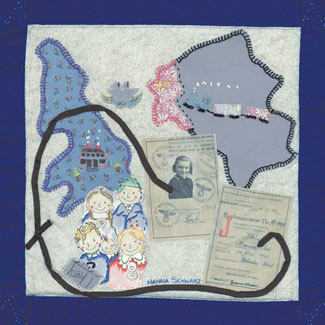
Detail from the Kindertransport Memory Quilt Project
Square by Hanna Schwarz
Link to Kindertransport Quilt Project